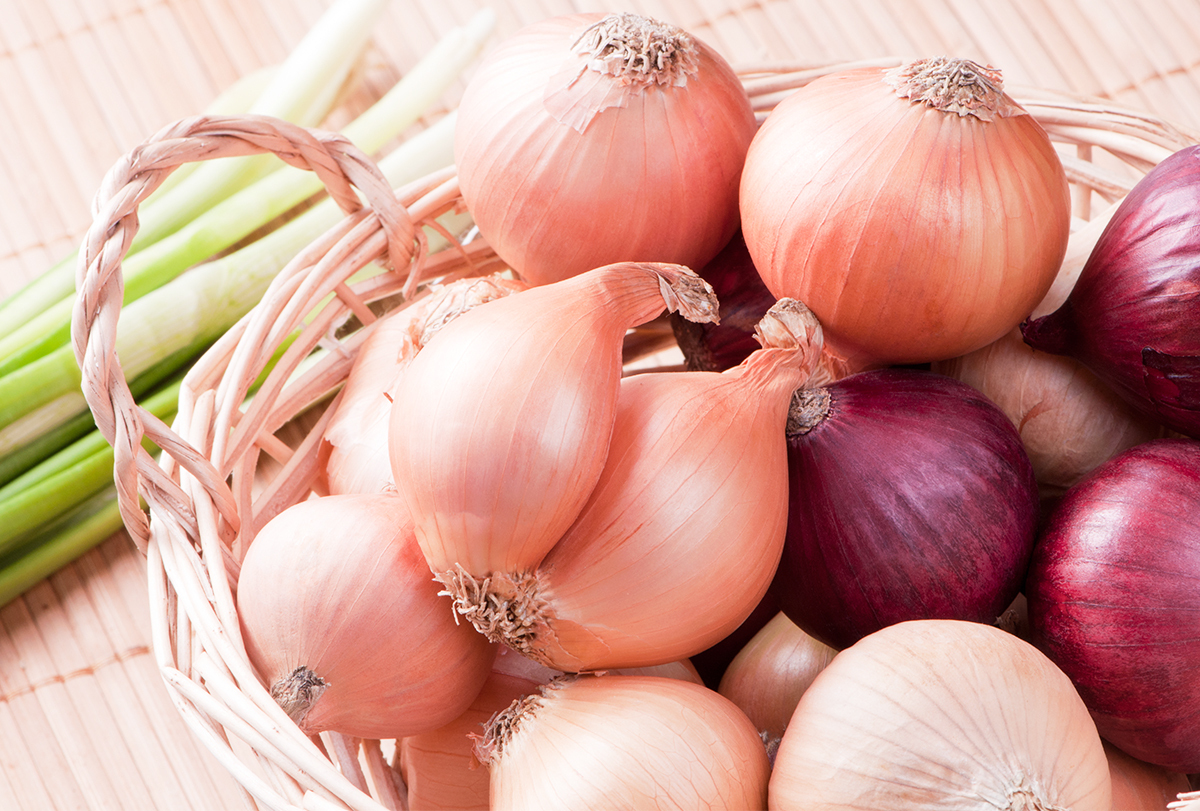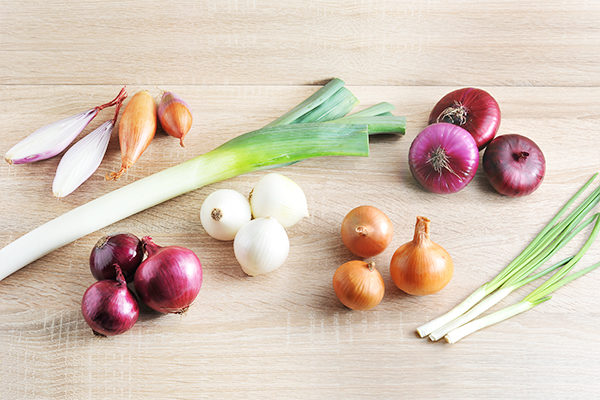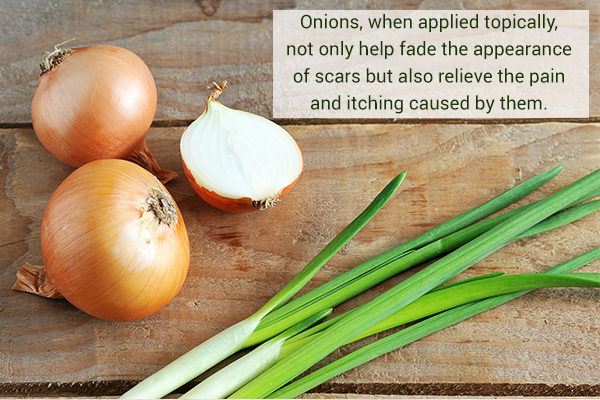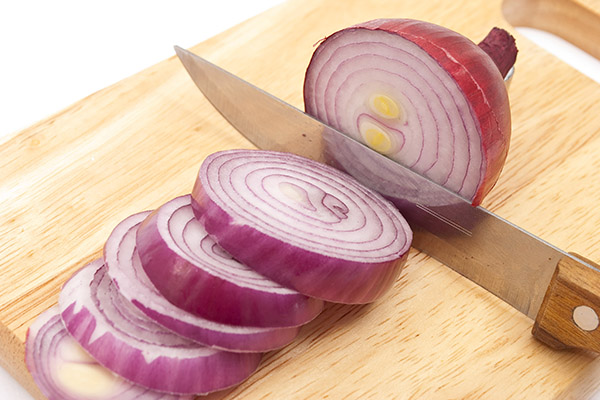In this article:
Onions are a staple crop and are used in cuisines throughout the world. They have been popular for centuries. There are over 300 varieties of onions and they come in different sizes, shapes, colors, tastes, and smells.

An estimated 46.7 tons of onions are grown worldwide. (1) They are the third most consumed vegetable in America, falling behind potatoes, tomatoes, and corn. Most onions are consumed fresh. (2)
Nutritional Information
Onions contain vitamins A, B, and C, folate, magnesium, and potassium. Onions are particularly rich in quercetin, an antioxidant flavonoid. (3) One cup of chopped raw onion contains 64 calories, 15 g of carbohydrate (of which 2.7 g is fiber), almost 2 g of protein, and no fat.
It also contains one-fifth of your daily needs for vitamin C, 10% of your daily requirement for B6, 10% of your daily manganese needs, 5% of your daily requirement for phosphorus, and 7% of your potassium needs. (3)
Types of Onions

Onions come in many different sizes, shapes, and colors:
- Brown or yellow onions: These bulbs have brown skin and creamy flesh. They have a strong flavor and a pungent aroma, which makes them very popular in cooking.
- Red onions: These bulbs have a red-purple skin and white flesh with a red outer layer. They have a sweet, mild taste and are often enjoyed raw.
- White onions: These bulbs are harvested before completely ripe and only kept for a short period. They are not as strongly flavored nor as pungent as brown or yellow onions.
- Green onions: These are also called spring onions, scallions, or salad onions. They have tiny white bulbs and green tops.
Health Benefits of Onions
Onions not only provide flavor and aroma to dishes but they also offer many benefits to health.
Note: While there are a few studies that support the health benefits of onion, more research is needed to warrant the dosage, safety, mechanism, and efficacy of onion in these aspects.
1. Helps to remove scars

Applying onion extract topically may help improve the appearance, pain, and itching of different types of scars. Studies have found that onion extract may help with keloids, hypertrophic scars, and scars from tattoo removal or surgery. (4)(5)(6)
2. Helps to regulate blood sugar
Onion peel extract and quercetin have been shown to help improve glucose tolerance and overall blood sugar in rats. (7)(8) In one study, fresh raw onion improved the fasting blood glucose levels in patients with type 1 and type 2 diabetes. (9)
3. May promote cardiovascular health
Quercetin, an antioxidant found in onions, has been shown to improve blood pressure and relax blood vessels. Onion extract has been shown to lower blood pressure in patients with hypertension. (10) However, many human trials are further needed. (11)
4. Helps to manage obesity
Studies done on rats found that onion peel tea and extract were effective at reducing glucose, leptin, and cholesterol levels. (12)(13) One study found that onion peel extract may help reduce overall weight and lower body fat percentage. (14)
5. Helps improve bone density
Onion juice may help fight against bone loss and improve bone mineral density through the antioxidant activity of various compounds present in onions. (15)(16)
Other Possible Benefits of Onions
Some studies revealed a positive correlation between onions and these health conditions:
How to Buy and Store Onions
Look for onions that are clean, have no opening at the neck of the bulb, are well-shaped without blemish, and have dry outer skins. Avoid any signs of mold or sprouting.
Keep onions in a dry space at room temperature, away from light and heat. Do not refrigerate onions, except for green onions. Keep onions in a perforated container that allows air to circulate around them. Chopped onions can be kept in an airtight container inside the refrigerator. Use within a few days.
Safety Information
While typically safe for use, those that consume large quantities of onions may experience heartburn or other gastrointestinal distress. Exposure to a cut onion may cause involuntary tearing.
Onion allergy
People with an intolerance to onion can usually take a small amount of cooked onions. Raw onions may cause a true allergic reaction in some people.
Drug interactions
Onions may interfere with the action of the following drugs:
- Aspirin: If you have an allergic reaction to onions, aspirin may increase your sensitivity to this vegetable.
- Medications for diabetes: If you are taking diabetic medications, taking high doses of onion extracts or supplements may lower your blood sugar to dangerous levels.
- Anticoagulants: Onions may slow blood clotting. If you are taking an anticoagulant or blood thinner, taking onion extracts or supplements may increase your risk of bruising or bleeding.
Most-Asked Questions About Onions

Are shallots a type of onion?
Shallots are part of the Allium genus and taste very similar to an onion but look more like garlic cloves. They are formed in clusters of cloves, and their papery skin is usually reddish-brown.
Do onions have adverse impacts on pregnancy?
Consuming onions in cooked foods is fine, although, for some women, it may exacerbate heartburn. Due to a lack of evidence regarding the safety, it is recommended to avoid consuming onion supplements during pregnancy or breastfeeding.
How do you cut an onion without getting teary eyes?
Using a very sharp knife and cutting while standing can help reduce crying.
Standing while cutting onions increases the distance from the onions and helps reduce the amount of particulates that can get in the air and irritate your eyes. Cutting onions by an open window may also help.
Are onion supplements safe during surgery?
Onions may slow blood clotting and can lower blood sugar, so it is best to stop taking onion supplements at least 2 weeks before surgery.
Can onions be eaten on a keto diet?
Onions do contain some carbohydrates. So, if you are following a keto diet, measure how much onions you consume to avoid going over the carbohydrate limit.
Expert Answers (Q&A)
Answered by Sarah Barreiro (Registered Dietitian)
Onions, or Allium cepa L., can be consumed raw or cooked depending on use.
The common side effects of eating raw onion are onion breath and gastric disturbance. People who are following a clinically prescribed low-FODMAP eating pattern should avoid the consumption of onion.
All varieties pose potential health benefits.
Onions may help hair growth, according to a few small studies for the improvement of alopecia areata. However, more research is needed to validate this claim. (23)(24)
If you are struggling with hair loss, focus on your current lifestyle and basic nutritional habits first before jumping into onion juice for hair growth.
Again, quercetin seems to have potential benefit in boosting overall health and, in terms of fertility, aiding in sperm mobility, according to one study. (25)
Quercetin is a bioflavonoid found in a variety of vegetables and fruits, including onions, berries, broccoli, and apples. A registered dietitian can prescribe the right amounts of bioflavonoids to consume.
No, substantial-quality research was done on this. However, it is unlikely to cause harm if someone is desperate and wants to give it a try.
Consumption of onions is best due to the immune-enhancing micronutrients and vitamins, including vitamin C.
Make homemade chicken soup with bone broth vegetables and lots of onion to help provide quality nutrition when sick with the flu.
Balance and variety are the keys. You can add purple onion into a nice mixed-green salad and use yellow or white onion in sauteing or cooking.
Onions provide great immune-enhancing micronutrients and vitamins and should be included for a nice source of the bioflavonoid quercetin, as well as other fruits and vegetables.
Final Word
Onions and other Allium vegetables are herbs that are valuable to cooking but also have health-promoting properties. They can be found in many forms, from raw to cooked, grilled, powdered, and stewed.
Onions have been shown to reduce the appearance of scars, manage blood sugar, and promote cardiovascular health.
- Was this article helpful?
- YES, THANKS!NOT REALLY


